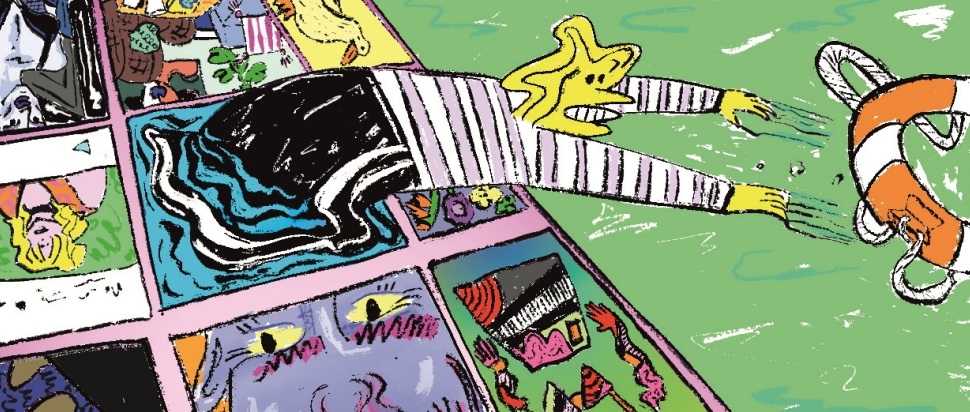Creative Clout: Social capital and creativity at university
It’s a tale as old as time: spoken word poetry is hot and everyone’s in a band. Creativity in university can seem synonymous with popularity – but it’s not always all it’s made out to be
I feel relieved to be out of university. I say it all the time. I said it at graduation. I say it at my new job. I say it to my family, to my boyfriend who’s still studying, to my friends who graduated before me. It’s always something along the lines of how great a time I had, but how glad I am to have left, moved on, started something else. Each time I say it, I worry people think I’m lying. I shouldn’t be as glad as I am. I did well at university, and no one is supposed to feel that great post-graduation. This should be my time for a personality crisis – impulsive hair-bleaching and self-destructive decision-making – not passing comments of relief.
I’m not lying, though – about the great time or the relief. My life began at university, or restarted at least. I turned eighteen at a Love Island Freshers party, and over the next four years formed almost all of the relationships I now cherish most. It was at university that I formed the precarious beginnings of my career as well – getting involved in student media alongside my English Literature degree and finding a kind of niche in writing and fashion. Starting university was my first exposure to hustle culture – where one creative project was fine, but three was better. I carried out my studies and retail work on autopilot, prioritising unpaid creative projects and portfolio building. I skipped lectures for photoshoot projects and read more article submissions for my student magazine than assigned seminar essays. It’s a way of life in certain academic spaces (mainly the arts ones, the elitist ones) that I adapted to well.
I thrived on the stress. I had a genuine love for what I was doing, but in these institutions, this hyperactivity is not only accepted – it’s idolised. In university, creativity holds social capital. In my first year I made almost no new friends. The amount of relationships I made, attention I got, and fulfilment I felt at university, rose directly in relation to the creative success I accumulated over the next three years. Not that these relationships were based entirely on creative social capital – it was a natural byproduct of interacting with more people. But it did serve to reinforce the idea that creative success made me more worthy of party invites, and that a decreased output risked social decline.
The kind of creative work I made became not entirely centred around what I was most interested in, but on work I knew my peers would respond to, liking and re-sharing on Instagram. I traded generic newspaper-style writing with more attention-seeking, taboo-pushing work. Less film reviews, more Pay Pig comment pieces and algorithm-friendly photoshoots. And it paid off. The work I made got more attention, which led to more opportunities and more friendships. But in these spaces, it’s hard to tell where creative evolution ends and catering to mass appeal begins. There’s a self-corrosiveness to it. I loved it, until I hated it.
The rise of this way of thinking has arisen in tandem with the age of Person As Product. We are obsessed with curating our brand image. Creative work shared by our peers dominates social media feeds, blurring the line between self-promotion and bragging. Creative social capital is not entirely about good art, or unique work, though – you have to be marketable in your own right, too. The feelings of comparison are infectious, making creatively-uninclined people feel the need to imitate this inauthenticity to fit in – adopting a homogenous dress-sense, political stance and ‘edgy’ creative style.
Think artsy photo dumps between grid-friendly poems; charity-shop Dickies; zine obsessions. In these white-dominated institutions filled with closeted middle-class twenty-somethings, liberal attitudes and aesthetics are a brand essential – but it’s a simple fact that the more money you have, the more resources you can access, the better your education background, the easier you’ll accrue social influence and creative success.
I’m not telling you to disengage from it, though. Telling a student interested in a career in creative industries to avoid portfolio building at university is, honestly, horrific advice. It’s some of the most open-ended creative freedom you’re ever going to get. These spaces have so much genuine creativity, passion, and opportunity to embrace. It’s not something to fear or pass up. But in my short time spent in the real world since leaving university, shutting yourself off to a lot of the noise is necessary for your own wellbeing, and a lesson you’re better learning sooner, rather than later. A while from now, that internship you’re going to apply for won’t care about your creative Instagram, but, in fairness, they will care about the practical work you did alongside your degree. Create the kind of work you want to make, share it as much or as little as you care to, but check in to make sure who you’re doing it for.
